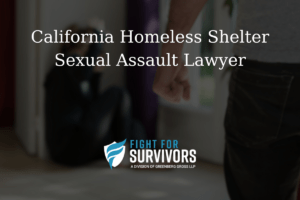
Fighting for Survivors of Sexual Violence in California Homeless Shelters
Homeless shelters are meant to provide safe housing for individuals facing homelessness, housing insecurity, and other crises. However, these facilities can also become sites of sexual assault, domestic violence, and sexual harassment, often perpetrated by staff members, other residents, or those exploiting vulnerable individuals. Survivors of sexual violence in homeless shelters deserve justice, safety, and legal protection.
If you or a loved one has been sexually assaulted in a shelter in southern California, legal action can help hold the perpetrators and negligent shelter administrators accountable. Greenberg Gross LLP offers comprehensive legal services to protect survivors’ rights and fight for justice.

The Reality of Sexual Violence in Homeless Shelters
People experiencing homelessness are disproportionately vulnerable to sexual violence. Many come from backgrounds involving domestic violence, child abuse, or human trafficking, seeking safe housing but instead facing further victimization. Reports indicate that women, youth, and immigrant survivors are especially at risk.
Factors contributing to sexual violence in homeless shelters include:
- Lack of oversight – Some facilities fail to screen staff members or other residents properly.
- Unsafe conditions – Overcrowding, poor security, and understaffing create an environment where violence can thrive.
- Fear of retaliation – Survivors often fear losing shelter, services, or access to affordable housing if they report their abuse.
- Legal barriers – Unhoused people may struggle to access legal services, making it harder to seek justice.
If you have been a victim of sexual violence in a shelter, you are not alone. Legal action can help expose unsafe conditions, force shelters to implement protections, and secure justice for survivors.
Holding Shelters and Perpetrators Accountable
Survivors of sexual assault in homeless shelters have legal options. Both staff members and shelter management can be held liable if they failed to protect residents from sexual violence.
Possible Legal Claims Include:
- Negligence – If a shelter fails to provide safe housing or ignores reports of harassment and abuse, they can be sued for negligence.
- Premises Liability – Shelters must maintain safe conditions for residents. If inadequate security leads to sexual violence, they may be legally responsible.
- Civil Lawsuits – Survivors can pursue financial compensation for medical treatment, trauma, and other damages.
Criminal Case Participation
If law enforcement brings a criminal case against the perpetrator, survivors may have the right to participate in the prosecution by providing testimony or evidence. While criminal cases do not provide direct financial compensation, they can hold abusers accountable and lead to criminal penalties.
Legal Services Available for Survivors
Legal action is often a necessary step in holding abusers and negligent organizations accountable. Survivors may need assistance with:
- Filing a report of sexual violence to law enforcement or shelter administrators
- Seeking protective measures, such as restraining orders
- Pursuing compensation for medical expenses, pain, and suffering
- Holding shelters accountable for their failure to provide safe housing
Greenberg Gross LLP offers legal services to survivors of sexual assault, sexual harassment, and domestic violence in shelters across California. Our experienced attorneys understand the legal challenges survivors face and are committed to providing strong legal advocacy.
Addressing the Larger Issue: Preventing Sexual Violence in Shelters
Ending sexual violence in homeless shelters requires systemic change. Legal action helps survivors obtain justice, but it also forces shelters and public officials to implement better protections.
Advocacy efforts focus on:
- Increasing oversight of shelter staff and security measures
- Providing legal resources for people experiencing homelessness
- Expanding access to safe housing for survivors of domestic violence and human trafficking
- Strengthening laws that protect victims of sexual violence in shelters
Public notices and reports have shown the urgent need for reform in shelters across southern California. Holding these facilities accountable is a crucial step in making shelters a safe place for all residents.
How Greenberg Gross LLP Can Help
Our law firm is dedicated to representing survivors of sexual violence in California. We understand the challenges survivors face and work to ensure they receive the legal support and resources they need.
We offer:
- A free consultation to discuss your legal options
- Experienced legal representation in civil lawsuits against negligent shelters and abusers
- Assistance with reporting sexual violence and navigating the legal process, including seeking justice in civil court
If you or a loved one has been sexually assaulted in a homeless shelter, you do not have to go through this alone. Contact Greenberg Gross LLP today to learn how we can help you seek justice.
Frequently Asked Questions
What should I do if I was sexually assaulted in a shelter?
If you have been sexually assaulted in a shelter, report the incident to a trusted advocate, law enforcement, or a legal professional. Seeking medical attention and documenting any evidence can also help support your case.
Can I sue a shelter for sexual assault?
Yes, shelters can be held liable if they failed to provide a safe place for residents. Legal action can help you recover compensation for your suffering and hold responsible parties accountable.
What types of compensation can I receive in a lawsuit?
Compensation may include medical bills, therapy costs, pain and suffering, and lost wages. In some cases, punitive damages may also be awarded.
How long do I have to file a lawsuit?
The statute of limitations for sexual violence cases varies, but California law allows survivors time to seek justice. Contact a lawyer as soon as possible to understand your legal options.
How can a lawyer help me?
A lawyer can help you file a lawsuit, gather evidence, and represent you in court. Legal representation is essential in fighting for your rights and ensuring justice is served.